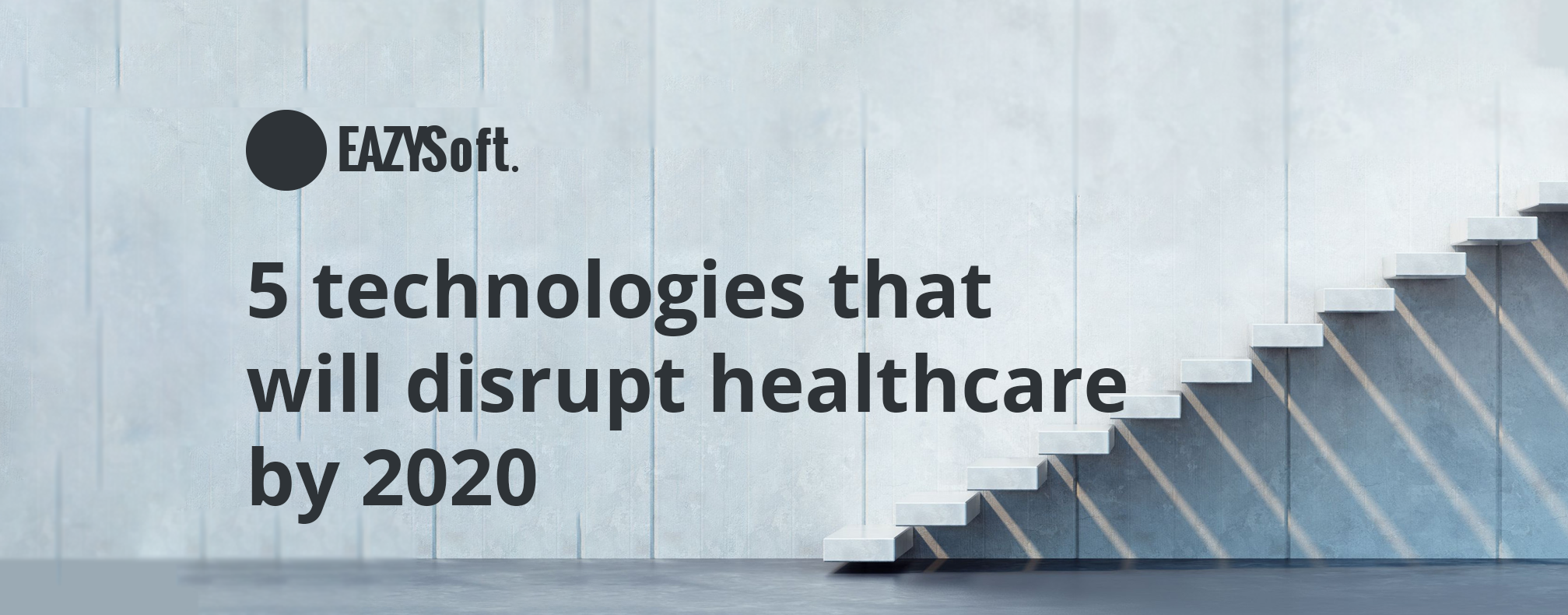
5 technologies that will disrupt healthcare by 2020
Technology is poised to shake up just about every aspect of healthcare from diagnosis to care delivery, from payment to purchase, from care providers to caregivers and, most importantly, care consumers. Within the next few years, we can expect significant improvements in consumer experience, cost of care, and health of populations as a result.
The key to success for any new technology is for it to be adopted by the industry as a whole. That’s especially true for advances in healthcare, as easy-to-use technologies and new reimbursement rules have encouraged providers and consumers to rapidly adopt connected devices, wearables and other technological advances to improve healthcare delivery and long-term patient outcomes. Take a look at how technologies will revolutionize the healthcare industry in future.
5 technologies that will disrupt healthcare by 2020
1. Artificial Intelligence
Artificial Intelligence (AI) is defined as the intelligence demonstrated by machines or software with the ability to depict or mimic human brain functions. AI in healthcare aims to improve patient outcomes by assisting healthcare practitioners in using medical knowledge, which has been thoroughly analyzed and memorized by these systems, thereby providing excellent clinical and medical solutions. AI systems have the potential to provide physicians and researchers with clinically relevant, real-time, quality information sourced from data stored in electronic health records (EHRs) for immediate needs.
By 2020, chronic conditions, such as cancer and diabetes, are expected to be diagnosed in minutes using cognitive systems that provide real-time 3D images by identifying typical physiological characteristics in the scans.
2. Immunotherapies
Immunotherapy provides therapeutic benefit by focusing on the capabilities of the immune system in regards to the tumor and promises to transform cancer care. It charts new territory in both individual duration of survival and the potential for significant numbers of patients to benefit. For example, malignant melanoma is a significant unmet medical need with limited treatment options. More than 160,000 cases of melanoma are diagnosed worldwide with 40,000 deaths annually.
The promise of immunotherapy rests largely in its aptitude for broad application in various patient populations. Once the algorithm for its effective use in the oncology setting is properly realized, the growth potential is humongous. While checkpoint inhibitors dominate the current headlines in the clinical care communities, other promising approaches include novel molecular constructs such as chimeric antigen receptors (CARs), therapeutic combinations with old and new drugs, dosing regimen modifications and vaccines.
3. Blockchain
Blockchain technology has the potential to transform health care, placing the patient at the center of the health care ecosystem and increasing the security, privacy, and interoperability of health data. In particular, blockchain technology may be the key to super-charging one of the most important medical trends of the last decade: medical record sharing.
Systems that allow the sharing of digital medical records between various providers have dramatically improved the continuity, efficiency, and outcomes of patient care. However, given the personal nature of medical records, security is always a concern. Blockchain technology promises to offer both the security necessary to ease privacy concerns and the efficiency necessary to improve patient care.
The security offered by blockchain technology may also benefit drug research, as people may be more willing to participate in clinical trials if they are confident that their private information will remain secure.
4. Big Data
Big Data has already taken other sectors to new heights of innovation and productivity. Business, finance, and even politics have been transformed by the seemingly endless analytical insights offered by big data. There are good reasons that healthcare should be next.
Drug development is one area in which data analytics can make a big difference. The democratization of medical data opens the doors for start-up pharmaceutical and research labs to disrupt the drug development industry. Data is a valuable resource that has the potential to drive innovation in this important field.
5. 3D Printing
3D printing technology has enormous potential in healthcare due to its ability to be customized. Customization can dramatically reduce surgery times and medical expenses. Currently, the largest applications are 3D-printed scaffolds or prosthetics (orthopedic implants) and medical devices, such as dental implants and hearing aids. The game changer for 3D printing will be in human tissue printing: printed livers, hearts, ears, hands and eyes, or building the smallest functional units of tissues, which can lead to the fabrication of large tissues and organs. This can be used as surgical grafts to repair or replace the damaged tissues and organs.
So, these five technologies have enormous potential to transform the healthcare industry. Many of these technologies are already on the drawing board and innovators around the world are working diligently to build, test, and introduce them to the market in that relatively short time frame.
